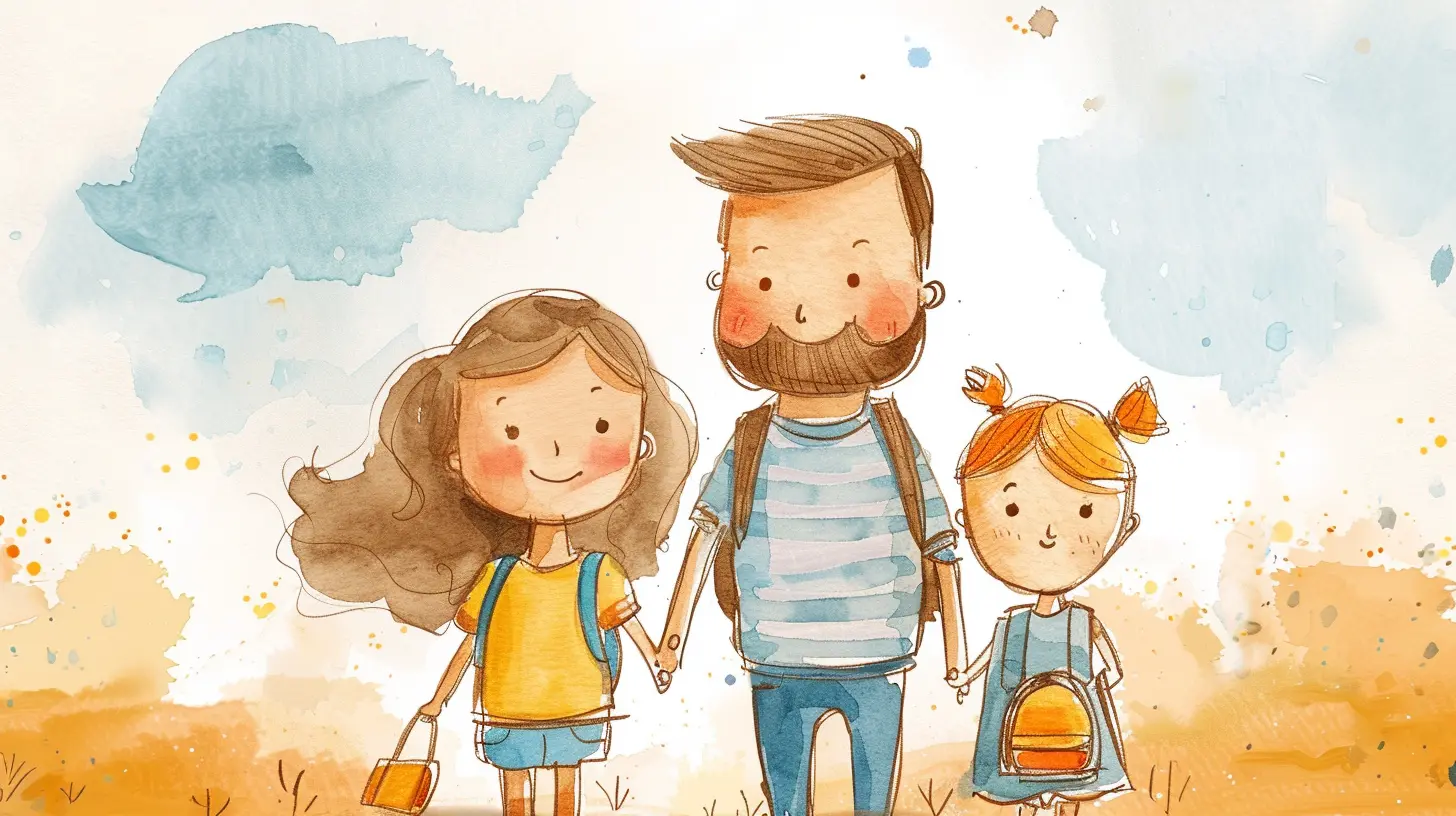Lifelong Learning for Parents: Setting an Example for Your Children
2 May 2025
Being a parent is one of the most challenging and rewarding roles in life. But have you ever considered that one of the best ways to guide your children is by showing them the importance of lifelong learning? Kids learn more from what we do than from what we say. So, if we want them to value education, curiosity, and personal growth, we need to practice what we preach.
Lifelong learning isn't just about getting degrees, reading books, or taking courses. It's about maintaining a curious mindset, adapting to new challenges, and continuously improving ourselves. Let's dive into why lifelong learning is crucial for parents and how you can incorporate it into your daily life to set a strong example for your children. 
Why Lifelong Learning Matters for Parents
1. Children Mimic What They See
Have you ever noticed how kids imitate everything their parents do? From the way you talk to how you respond to challenges, children absorb your habits like sponges. If they see you eager to learn new things—whether it's cooking a new dish, learning a language, or picking up a new skill—they'll naturally adopt the same mindset.When kids grow up in a household where learning is part of everyday life, they are more likely to develop an intrinsic love for knowledge. You won’t have to force them to study; they’ll do it because it’s what they see you doing.
2. Keeps You Relevant in an Ever-Changing World
Let's be honest—times are changing fast. Technology, education, and even parenting strategies evolve constantly. If you stop learning, it’s easy to feel outdated. You might find yourself struggling to understand your child's schoolwork, the latest tech trends, or even the way they communicate with their peers.By embracing lifelong learning, you stay informed and engaged in the modern world. This not only helps you stay connected with your kids but also ensures that you can provide them with relevant advice and guidance.
3. Improves Your Parenting Skills
No one is born knowing how to be a great parent. We all learn along the way. There's no shame in reading parenting books, attending workshops, watching educational videos, or seeking advice from experts. Parenting is a skill that evolves, and learning new strategies can help you handle challenges with more confidence.For example, if you're struggling with your child's tantrums, learning about child psychology can equip you with better ways to manage their emotions. Just like any other area of life, parenting benefits greatly from continuous education. 
Ways to Incorporate Lifelong Learning into Your Daily Life
1. Read Regularly
Books, articles, and research papers are goldmines of knowledge. Whether it’s a book on self-improvement, a novel, or even an article about new parenting techniques, reading keeps your mind active and engaged.To make it fun, involve your children too! You can set up a family reading hour where everyone reads their favorite book and later shares what they’ve learned. This simple habit fosters a culture of curiosity in your home.
2. Take Online Courses or Attend Workshops
The internet has made learning more accessible than ever. There are tons of online courses available on virtually any topic—parenting, finance, communication skills, personal development, and more. Websites like Coursera, Udemy, and Khan Academy offer courses that can fit into your schedule.Attending local workshops or joining community learning groups can also be a great way to expand your knowledge while networking with like-minded people.
3. Learn a New Skill with Your Child
Imagine learning how to play the piano, coding, or painting alongside your child. Not only does this create a bonding experience, but it also shows them that learning isn't just for school. It’s a lifelong journey that can be fun and rewarding.This also removes the pressure from children. Instead of feeling like they "must" learn, they see it as a joyful activity that even their parents participate in.
4. Challenge Yourself with New Experiences
Routines can make life comfortable, but growth happens outside of our comfort zones. Try challenging yourself with new experiences like traveling to a different country, trying a new hobby, or even engaging in activities that push your mental and physical boundaries.By constantly seeking new experiences, you're teaching your children that it's okay to try new things—even if they feel uncomfortable at first.
5. Have Meaningful Conversations with Your Kids
Lifelong learning isn’t just about acquiring new skills—it’s also about understanding different perspectives. Take time to have deep conversations with your children. Ask them about their thoughts, interests, and opinions. Encourage them to question things and think critically.This not only helps them develop confidence in expressing themselves but also strengthens your bond with them. 
Overcoming Barriers to Lifelong Learning
1. "I Don't Have Time"
One of the biggest hurdles parents face is a lack of time. Between work, house chores, and taking care of the kids, squeezing in learning might seem impossible. But the truth is, learning doesn’t require hours of free time.You can listen to podcasts while driving, read articles during lunch breaks, or even watch short educational videos before bed. Small, consistent efforts make a big difference over time.
2. "I'm Too Old to Learn New Things"
It’s never too late to learn. The human brain is designed for continuous learning, no matter the age. If you believe learning is only for the young, you’re limiting yourself.Think about people who start new careers at 50, take up painting at 60, or even go back to school in their 70s. Age is just a number when it comes to growth.
3. Fear of Failing
Many adults fear failure, which stops them from trying new things. But failure isn't the end—it's part of learning. If you try something and don’t get it right the first time, you're still learning.Encourage your kids to embrace failure as part of growth. When they see you handling failure with a positive attitude, they’ll learn to do the same in their own lives. 
The Ripple Effect of Lifelong Learning
When you commit to lifelong learning, the benefits extend beyond yourself. Your children will grow up in an environment where curiosity and growth are valued. They’ll become more open-minded, resilient, and motivated to keep improving themselves.In a world that is constantly evolving, the best gift you can give your children is the example of an adaptable and curious mindset. Show them that learning doesn’t stop when school ends—it’s a lifelong adventure.
So, what’s the next thing you want to learn? Whatever it is, start today. Your children are watching, and they’ll follow your lead.
all images in this post were generated using AI tools
Category:
Lifelong LearningAuthor:

Olivia Lewis
Discussion
rate this article
7 comments
Zacharias McGeehan
Great reminder! Parents inspire through their own learning journey.
May 8, 2025 at 10:59 AM

Olivia Lewis
Thank you! Absolutely, our learning journeys can greatly influence our children's growth and curiosity.
Chantal McIlwain
This article highlights a crucial aspect of parenting: modeling lifelong learning. By embracing education ourselves, we not only enrich our lives but also inspire our children to value knowledge and curiosity. It’s a powerful example that shapes their future.
May 7, 2025 at 6:34 PM

Olivia Lewis
Thank you for your insightful comment! Modeling lifelong learning truly does inspire our children and sets a strong foundation for their future.
Amber Bowers
Who knew parenting came with a side of homework? Remember, kids learn by watching—so let's master the art of lifelong learning and dodge that homework guilt together!
May 7, 2025 at 1:05 PM

Olivia Lewis
Absolutely! Embracing lifelong learning not only enriches us but sets a powerful example for our kids. Let's inspire them together!
Juno McVaney
In the garden of knowledge, parents sow seeds, With every lesson learned, a vibrant bloom indeed. Modeling curiosity, they light the way, Inspiring young hearts to explore and play. For in lifelong learning, a legacy grows, Nurturing wisdom, as the river of life flows.
May 6, 2025 at 8:13 PM

Olivia Lewis
Thank you for your beautifully expressed thoughts! Your poetic reflection perfectly captures the essence of how parents can inspire a love for learning in their children through example and encouragement.
Harlow Warren
How can parents inspire curious minds?
May 6, 2025 at 12:29 PM

Olivia Lewis
Parents can inspire curious minds by modeling a love for learning, asking open-ended questions, and encouraging exploration and creativity in everyday experiences.
Kendra McClure
Embrace learning together—you’re shaping bright futures one lesson at a time!
May 4, 2025 at 8:48 PM

Olivia Lewis
Thank you! Embracing learning together truly sets the foundation for a brighter future for our children.
Ivory Jimenez
Unlock the hidden potential within your family; the journey of lifelong learning can transform not just your life, but also the minds of the little ones who watch and learn from you.
May 2, 2025 at 11:59 AM

Olivia Lewis
Thank you for your insightful comment! Lifelong learning is indeed a powerful way for parents to inspire and shape their children's future.
MORE POSTS

The Importance of Learning Objectives in Formative and Summative Assessments

The Role of Design Thinking in Problem-Based Learning

How Virtual Field Trips are Bringing the World to Students

How Project-Based Learning Encourages Deeper Student Engagement

The Future of Education: Personalization Through Learning Styles

The Best Time Management Tips for Exam Day